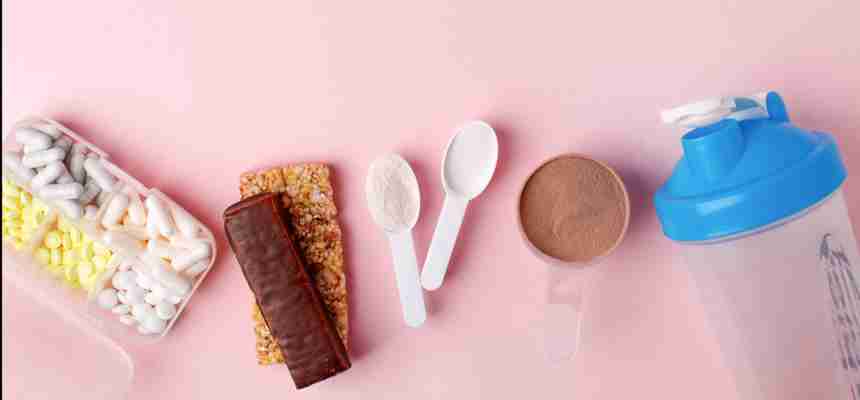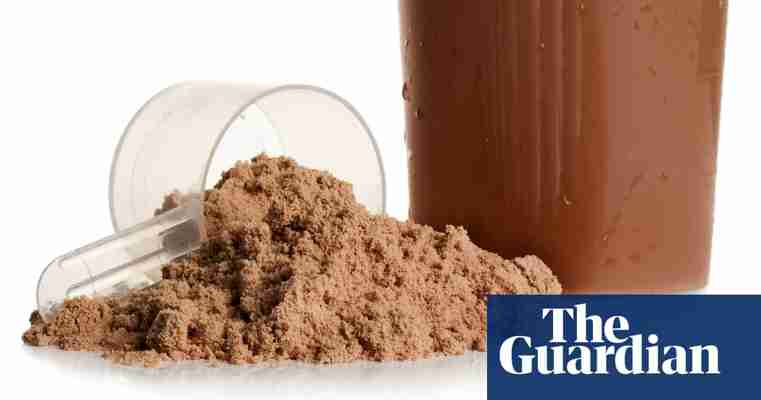Should Men & Women Use The Same
Traditionally, the protein powder industry was dominated by men. Because of this, it’s been a daunting task for women to find protein powders that are tailored to them.

But are there any major differences that women should consider in protein powders that they can’t get from using the protein a man uses? As a woman, you’ve probably checked the label of a loved one’s protein powder and wondered if you should use it?
Here, we’re going to take a look at what the major differences are between women’s and men’s protein. By the end, you’ll be armed with some key points you should remember next time you’re shopping for protein powder and before you start your next workout.
Protein Is… Well… Protein
It’s important to remember that protein is protein no matter the shape or form it comes in. To put it another way, there aren’t specific proteins for women and other kinds of protein for men.
So at least on the surface, there’s no reason you can’t use a protein powder that’s marketed towards men. As a matter of fact, there are some major supplement brands that have started putting varied serving suggestions on their labels for women and men alike.
However, the answer to your question about protein powders for women and men isn’t as simple as that. There’s a strong probability that these “unisex” protein powders aren’t the best ones for you to use. There are several factors you need to take into consideration when making a purchase.
What Are The Major Differences Between Women’s And Men’s Protein Powders?
Physiologically speaking, women and men are different. As such, it makes a lot of sense that each sex’s nutritional requirements are going to vary.
For example, generally, a woman requires fewer calories, carbs, fats, and proteins than men.
Because of this, it’s common for protein powders for women to have less protein in each serving.
But beyond just the protein content, women’s protein powders typically have additional ingredients that a women’s body needs to stay in top condition.
These ingredients include:
Folic Acid is essential for women that are pregnant or trying to be. It also helps women fight the dangers of strokes, heart disease, and several kinds of cancer.
Vitamin B6 which helps women maintain healthy immune systems and can help reduce heart disease.
Iron which assists red blood cells in the transportation of oxygen throughout the body. Because women lose a lot more blood than men due to their monthly cycle, women need more iron than men in order to fight fatigue or anemia.
Because of these reasons, women’s protein powders typically have a higher content of folic acid, vitamin B6, and Iron.
Additional Key Points To Consider
It’s also important to note the number of sugars that a lot of today’s protein powders use in their formulas. Protein powders, in general, have been known as bland (or in some instances, absolutely disgusting) to the pallet. They’ve tasted synthetic or sometimes completely flavorless.
Because of this, efforts have been made to improve the taste of powders that are sold. This is especially true for powders that are marketed directly to women.
But the best protein powders for women won’t add a lot of sugars just to give users a boost in flavor.
At the same time, don’t always trust brands that are marketed as “zero sugar added.” Often, these brands will use substitutes for sugar, such as sucralose or aspartame. These additives are worse for your body than natural sugar.
If what you’re looking for is a natural solution that doesn’t contain a lot of processed sugar, look for brands that use natural sweeteners such as honey or stevia.
Should You Use The Same Protein Powder As A Man?
Don’t assume that you’re automatically barred from using your boyfriend’s or husband’s amply available protein powder. Using his is definitely better than using nothing at all.
However, now you’re equipped with specific information about what women’s protein powders can do for you, and how it is an improvement over using his.
Be sure to consult with your healthcare provider before starting any new supplement or exercise program. Once you receive clearance, you will be ready to begin using a quality women’s protein powder that might be just the thing you need to finally push you toward your ultimate goal.
Protein Use By Men And Women FAQs
Do Women Need Different Protein Than Men? The Institute of Medicine estimates that, on average, men should get about 56 grams of protein per day and that women should get about 46 grams. It adds that your body breaks down dietary proteins to amino acids.
Do Women Need Different Protein Shakes? WE'VE ALL BEEN FOOLED! #TheTruth. Unfortunately, many sports nutrition brands over the years have fooled women (& men!!) into thinking that they need different types of whey protein. The truth of the matter is that there isn't a different whey for men & women - it's all the same!!
Can Women Use Any Protein Powder? Although often associated with men looking to bulk up, these supplements are favored by women as well. In fact, many protein powders are now marketed specifically to women. They're an effective tool for women looking to lose fat, tone up and improve strength.
Do Women Need More Protein Than Men To Gain Muscle? Everyone, from babies to seniors, men, and women, needs to consume enough protein. Compared to men, though, women are more likely to be consuming a less-than-optimal amount. Make sure you and your female clients know just how important protein is in the diet. It does much more than build big muscles.
Pumped on protein: can a shake ever be as good as a plate of food?
Protein is big business: as pumped-up as any ripped bodybuilder. The drinks, powders and bars that were once the preserve of top athletes have found their way into suburban kitchens and spawned an industry worth $96bn worldwide. In the UK we spend more than £66m a year on sports nutrition products: recent research found nearly a quarter of us, and 42% of men aged 16-24, had consumed one in the past three months. High street chains sell protein drinks and pots, and last year saw a rise in popularity among women.

But are they worth the hype? Protein supplements are pricey, usually heavily processed and, new research suggests, potentially unnecessary. And is a protein shake any better than a handful of nuts or a chicken breast?
The optimum amount of protein needed each day depends on your size and how active you are. The widely accepted dietary reference intake recommends around 0.75g protein per kg body weight – roughly 50g for an average sedentary person.
Nutrition scientist Bridget Benelam of the British Nutrition Foundation says most people eat much more than that. “As a population we’re consuming well above the level of protein needed for health. There is evidence that 20g consumed after exercise can help with muscle growth and repair, but this can be provided by a small chicken breast, a can of tuna or three medium eggs.” Unless you’re an elite athlete, she says, no one needs protein supplements.
Three medium eggs can provide 20g protein. Photograph: Getty
Danny Richards, a 23-year-old management consultant and keen gym-goer, got into protein shakes at university. “I was bodybuilding to bulk out,” he says. “I wanted to gain muscle and change from a skinny kid to a more manly shape. I had a protein shake after a workout to repair and build muscle.” He was aiming to consume 2g protein a day for every kg body weight (eg 160g protein for an 80kg man) – but found it hard to eat that much. “It meant cereal and yoghurt for breakfast, five eggs with baked beans for lunch and 300g tuna with pasta for supper.” It takes a while to eat all those eggs – but, as Richards points out, only seconds to drink a shake. He also found shakes cheaper and more convenient than shopping for the equivalent foods.
But now he’s switched to cross-training and wants to maintain rather than increase muscle mass, he’s ditched the shakes and sticks to a balanced diet. “There’s a lot of hype around shakes; some people seem to think they have supernatural properties, but really it started as a clever way for farmers to offload waste products from milk. They don’t do any harm, but there’s no real difference between food and a shake.”
Does Benelam agree? “Getting protein from foods has the benefit that other essential nutrients will also be provided and a healthy eating pattern encouraged,” she says, adding that many shakes contain hidden additives. “Protein supplements are typically based on whey from milk, but other proteins, such as soy, pea or egg, are used, too. They may also contain sugars, sweeteners, flavourings and colours.”
Nor are all supplements equal. Take whey and caesin, says sports nutrition specialist Dr Mayur Ranchordas, of Sheffield Hallam University. While whey “is rapidly absorbed and increases muscle mass, casein releases more slowly and, if taken at night, encourages protein synthesis during sleep”.
Protein might make you feel full for longer than high-carbohydrate foods, but overdoing it and leaving out other food groups can lead to imbalances in the diet, such as a lack of fibre. Ranchordas says most people can get enough protein from food but it depends on your goals and diet. Vegans may find supplements useful, especially if they do a lot of exercise; professional footballers will benefit from taking in protein soon after a match to help muscle recovery; a 30-year-old who starts training for a marathon would do well to consume 20-25g of protein every three to four hours – but this is achievable with lean fish and meat.
Walnuts are another great source of protein. Photograph: Alamy
You can’t stockpile protein, Ranchordas says. “There’s an upper limit to how much you can take in at any one time. Once you’ve eaten a 30g serving, you won’t absorb any more.” What happens if you overeat protein? “It just comes out in your wee. There’s no evidence that too much protein causes harm in healthy individuals.”
Nutrition scientist Ruth Ash disagrees, warning that overeating protein can lead to weight gain. “It has four calories per gram – the same as carbohydrate. If you take in more than you burn, you gain weight and excess is stored as fat.” She also fears too much protein can put pressure on the kidneys.
The key is to eat enough protein without excess calories, unhealthy additives or crowding out other essential nutrients. Food can be as bad as shakes – processed and red meat are full of protein but unhealthy in excess. The meat-free products I buy for my vegetarian children, while low in fat and sugar, are full of salt and chemicals to make them palatable.
Investment analyst Max Stein, 26, has had at least one protein shake a day for the past seven years. He feels – and looks – great, though he had stomach issues at first. “Shakes are cheaper and more convenient than chicken breasts,” he says. “I have one after a workout. Most of my male friends and a growing number of female friends use them. It’s not a big deal.”
Experts may be reassuring about the safety of protein drinks – but that doesn’t make them any more appetising. I’ve done a couple of marathons and a week-long charity bike ride, and tried some drinks during my training. They tasted horrendous and I struggled to keep them down.There’s no way I’ll be swapping real food for a tub of powder; give me a stir-fry and a bag of nuts any day.
Food maths: what does 50g protein look like?
1 grilled steak (200g)
310 calories
200g cheddar cheese
800 calories
7 boiled eggs (350g)
500 calories
350g Quorn chicken-style pieces
336 calories
350g whole walnuts
2,412 calories
2 grilled chicken breasts (200g)
215 calories
1 tin tuna in water (200g)
226 calories
3.5 scoops diluted protein powder
280 calories
A personal trainer who eats only 2 meals a day reveals why he won't touch a protein shake
With the rise in popularity of gruelling, high-intensity workouts, protein shakes have become a post-workout go-to for many.

There's no doubt that protein is an important part of post-exercise muscle recovery.
But not everyone's convinced we need to be consuming shakes in this way.
Personal trainer Max Lowery, 28, says he has never had a protein shake in his life — and doesn't intend to.
He believes they're unnecessary for about 90% of people.
As summer kicks off, many people will be well into a healthy regime, whether that's following a new diet or a fitness plan.
With the rise in popularity of gruelling, high-intensity workouts, protein shakes have become a post-workout go-to for many. We're constantly promised they'll repair destroyed muscles and prevent the dreaded two-day burn.
It's also no wonder gyms are promoting their fancy new shake bars, which come in at more than £7 ($9) a pop sometimes, as a nice little add-on to your already pricey gym class.
There's no doubt that protein is an important part of post-exercise muscle recovery. But not everyone's convinced we need to be consuming shakes in this way.
Before becoming a personal trainer, Max Lowery, 28, who created the 2 Meal Day intermittent fasting plan, was a professional sprinter for four years.
He told Business Insider why he has never taken a protein shake in his life — and doesn't intend to.
W e e k l y G o a l s -- If it doesn't challenge you, it won't change you. Challenge yourself this week

